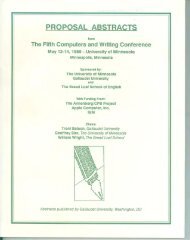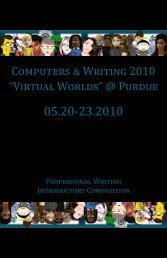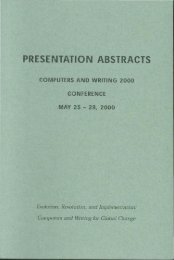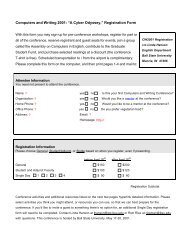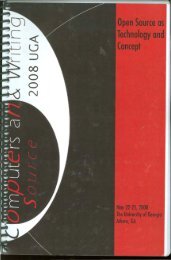CW2001 Program - Computers and Writing
CW2001 Program - Computers and Writing
CW2001 Program - Computers and Writing
Create successful ePaper yourself
Turn your PDF publications into a flip-book with our unique Google optimized e-Paper software.
Saturday<br />
10:00 — 11:30 Session G.9<br />
Preservice Teachers <strong>and</strong> Technology Issues<br />
RB 112<br />
John Walter, moderator<br />
Deb Brown <strong>and</strong> David Elias<br />
The Technological Professionalization of Preservice Secondary<br />
Education Teachers<br />
Among the critical issues that teachers <strong>and</strong> teacher educators<br />
face is the issue of effective <strong>and</strong> appropriate uses of technology.<br />
Although much attention has been given to practical <strong>and</strong> ethical<br />
questions related to students using computers, less attention has<br />
been paid to the use of computers in teacher education, specifically<br />
in the professionalization of new teachers. The effects of this political<br />
discussion enabled some students to reflect critically on the inevitability<br />
of political content in the teaching of writing, the political <strong>and</strong> politicizing<br />
nature of professional discourse, <strong>and</strong> the political opportunities <strong>and</strong><br />
pitfalls of the rhetoric of email.<br />
Beatrice Smith<br />
Preservice Secondary Education Majors <strong>and</strong> Discipline-Based<br />
Electronic Literacy Development<br />
Even though the theory <strong>and</strong> practice of teaching reading <strong>and</strong> writing<br />
in the disciplines have become requirements for teacher certification<br />
in many states, it is the case that while preservice teachers are experts<br />
in their disciplines, many fail to appreciate their roles as experts in the<br />
literacy development of their students. This presentation focuses on the<br />
ways in which secondary education majors from across the disciplines<br />
are offered experiential learning using computer-assisted contexts in<br />
high schools as a way of involving them in instruction. This presentation<br />
discusses reactions <strong>and</strong> reflections about using electronic presence as<br />
a component to teaching literacy across the disciplines.<br />
90 <strong>Computers</strong> & <strong>Writing</strong> 2001



